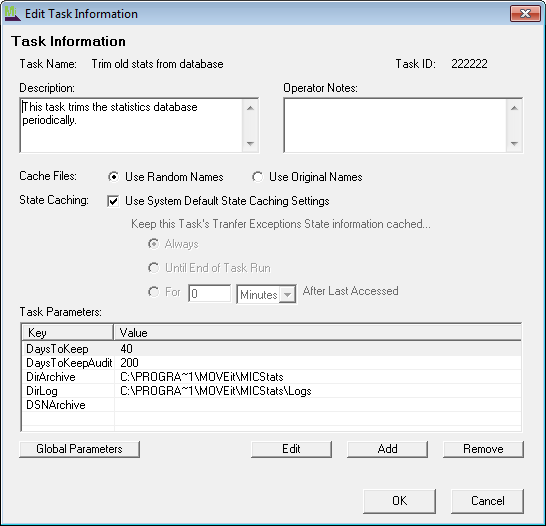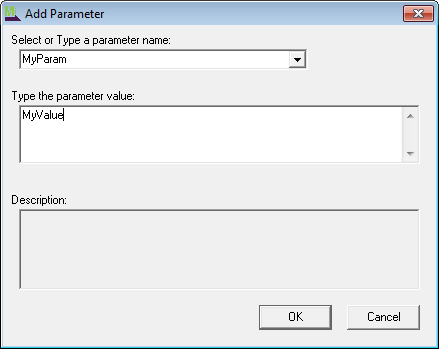In addition to sources, processes, and destinations, tasks have several optional settings that apply to the task as a whole. These settings include a description, operator notes, cache file naming convention, state file caching, and a collection of name=value task parameters that can be accessed by scripts and macros. To access the Task Information dialog, right-click on a task and select the "Edit Task Info..." option.

The description and operator notes fields can be used to contain any information about this task. The cache file setting determines whether MOVEit Automation cache files will have automatically generated random names (for example, "atc0035.tmp"), or their original names, when stored in Central's cache directory for processing. If the Use Original Names option is selected, and one or more of the task sources use the "Include Subdirectories", files will be stored not only with their original name, but with the correct relative folder path as well (for example, "software\v2.6\installfile.exe"). This feature is useful when creating zip files of an arbitrary collection of files.
The Use Default State Caching Settings option, if checked, will cause this task to use the system’s default State Caching settings. If unchecked, the task will use the specified State Caching settings. By default, MOVEit Automation always keeps state file information cached in memory in order to achieve maximum efficiency. In certain environments, however, this can become quite memory intensive. The State Caching settings can be used to remove state file information from memory after a task run or even after a specified amount of time.
Task parameters can be useful when you have a need to perform similar, but not identical, scripts processing in several different tasks. You can write a single script whose behavior is customized for the task at hand by examining task parameters.
To add a task parameter, click the Add button. This will open the Add Parameter dialog. Here, the user can enter a new parameter and a value to set for it, or select from one of the existing parameters used by any built-in processes that are loaded in MOVEit Automation. Selecting an existing parameter will cause a short description of the parameter to be displayed, and, depending on the type of the parameter, change the value field to enforce specific values. Custom parameter names may only contain the following characters (including capital letters):
abcdefghijklmnopqrstuvwxyz._:
Different built-in task parameter types include the basic text type, a numeric type (which only allows entering of numbers), a choice-based type (which will display the available choices in a drop-down menu), and PGP Recipient and Sender key types. These last two types are used with PGP built-in processes to select PGP keys from the key selection dialog. Pressing the button to the right of the field will open this dialog.

Existing parameters can be edited by double-clicking on the parameter entry in the list. This will bring up a the Edit Parameter dialog, where the user can change the name or value of the parameter. Deleting a parameter can be done by selecting the parameter and clicking the Remove button.
You can read and/or set task parameters in processes with the "MIGetTaskParam" and "MISetTaskParam" commands. You can also use the value of a task parameter in any macro using "[Parm:ParameterName]" syntax.
If a task parameter contains a macro, the macro is automatically expanded when a task is run. For example, a task parameter with a value of The year is [YYYY] would be treated as if it were The year is 2005 (assuming the year is indeed 2005).